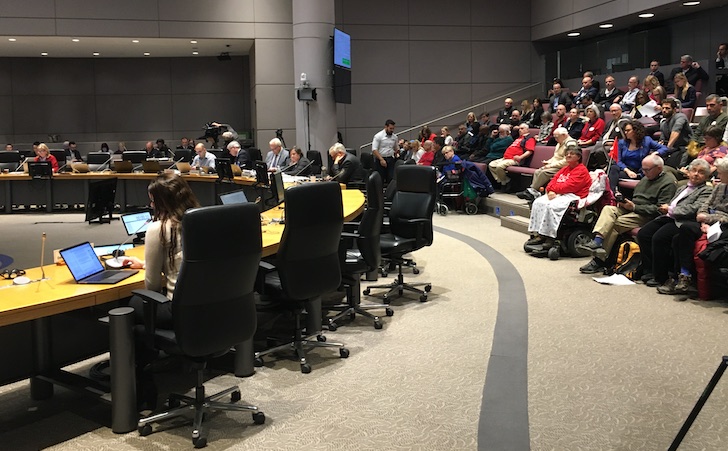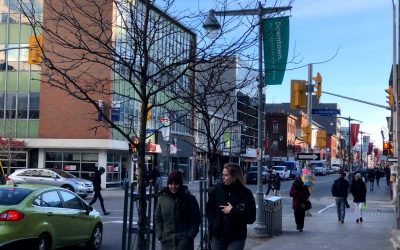Proposed regulations not enough: housing advocates

Andrew S. Haydon Hall was packed on Nov. 15, 2019, for a special committee meeting on short-term and long-term rentals in Ottawa. Photo by Kate Schellenberg.
While the main attraction at City Hall Friday may have been a debate over tougher regulations for short-term Airbnb-style rentals, dozens of housing advocates showed up at the same council committee meeting with something different in mind.
Amidst the dozens of members of the public sporting Airbnb pins on their lapels were an equal number of people clad in red T-shirts from the anti-poverty group ACORN. The organization claims 30,000 members in the Ottawa area, all identifying as low or middle-income individuals.
They came to City Hall to attend a meeting of council’s Community and Protective Services Committee. ACORN is arguing for formal licensing of all landlords.
“Toronto has formal licensing and it’s bad in Ottawa,” said Steven Wittenberg, a member of ACORN. “People are living with mould and bugs. People are being treated unfairly.”

The formal licensing mentioned by Wittenberg is called RentSafeTO. It is Toronto’s Apartment Building Standards, a by-law enforcement program. All landlords must register with the program and every building is inspected by the city and given grades based on the building’s liveability. Those with the lowest grades get visited regularly by by-law officers until their grade improves.
ACORN is calling for a similar program in Ottawa. During the special meeting, Rideau-Vanier Coun. Mathieu Fleury proposed a motion to look at adopting a pilot program similar to RentSafeTO.
“As a pilot, regulation should be enacted in the areas of Sandy Hill and Vanier. The trial should be evaluated after two years,” Fleury said.
If the program proved to be successful, the city could consider expanding it to other neighbourhoods. The proposed program would require landlords to pay to register their buildings with the city.
Not everyone is on board with this proposed program. “[Landord registration] has been proven not to work in other communities,” said Victor Menasce, vice president of Ottawa Real Estate Investors Organization.
“When you institute new rules, and additional costs, [landlords] have no choice but to pass them on to tenants,” said Menasce. He said Fleury’s stance was “misguided” because landlord registration ultimately reduces affordability for tenants.
The decision regarding the program had not been made at the time of publication.
“Housing, it’s gotta change. It has to change. The way things are going, it’s unfair.” said Wittenberg.
No fear in the Glebe
Local businesses appeal to their customers on Black Friday.
Ready to roll: e-scooters coming to Ottawa
The Ontario government announced a five-year pilot plan for e-scooters on Wednesday. What will it mean for Ottawa pedestrians?
The More You Woe News Briefs
Keeping you informed on updates to your Ottawa woes





